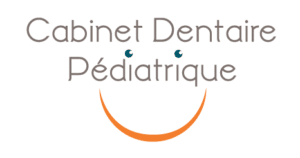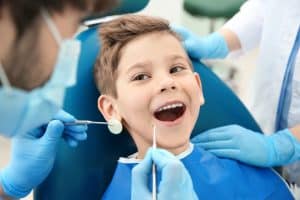Milk teeth can be affected by cavities for a variety of reasons: a diet high in sugar, a child suffering from MIH (hypomineralization of the molars and incisors) or poor oral hygiene.
When the diet is high in sugar and brushing is irregular or poorly done, plaque builds up and attacks the enamel causing cavities. Sometimes decayed baby teeth are broken.
Find out what to do if this happens to your child and what the dentist can do depending on the fracture.
Can a decayed tooth break?
Baby teeth break more easily than permanent teeth because they are less stable.
When plaque builds up, its acidity attacks the tooth enamel. The cavity then forms a hole in the dentin. This hole progresses very quickly.
Without prompt attention, the hole will grow and weaken the tooth. As a result, a tooth may eventually break.
Decayed and broken baby tooth: what to do?
A cavity should never be ignored, even on a baby tooth. The first thing to do is to quickly make an appointment with a pedodontist.
During the visit to the dentist, he or she will be able to take an X-ray and make sure that the extent of the decay and the germ of the permanent tooth are not affected.
If the tooth is only slightly broken, the dentist will perform a cavity curettage to remove bacteria and sanitize the tooth. If the tooth is more severely broken, it may be extracted and replaced with a space maintainer.
How do you prevent other baby teeth from decaying and breaking?
Caries is not a minor problem, even on baby teeth. In fact, problems with baby teeth can cause major problems with the permanent teeth.
It is therefore necessary to recall some good practices in dental hygiene.
Brushing teeth to start. It is essential to brush the teeth of babies with a soft toothbrush and a toothpaste correctly dosed in fluorine according to the age.
Diet also plays a big role in the development of cavities. It is therefore advisable to educate your child to taste more salty than sweet and to limit his sugar consumption.
For the smallest, one of the main causes of cavities is the caries of the early childhood, also called "syndrôme du biberon".
Some children take sugary drinks at night to soothe themselves. However, consuming sugary drinks at night when teeth are not immediately brushed is strongly discouraged.
Beware, if unsweetened milk is less aggressive, lactose is still a carbohydrate and should also be avoided.
For the much rarer cases of children with MIH (hypomineralization of molars and incisors), the dentist may suggest applying a fluoride varnish to the teeth and sealing the grooves to preserve the healthy teeth.






